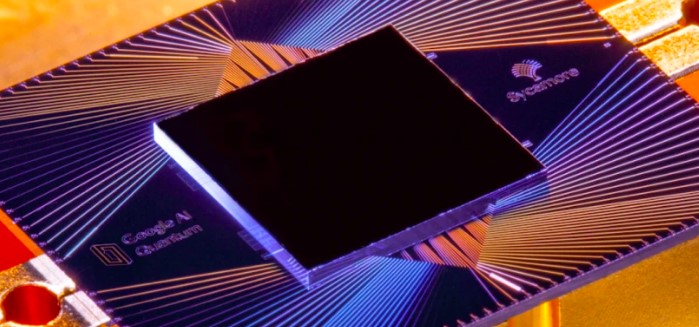Created by leading experts in the field of quantum computing, this comprehensive exploration “What is a Benefit of Interference in Quantum Computing?”. Let’s dive into the realm where physics, mathematics, and computer science intersect to create the next big leap in computation.
Understanding Quantum Computing: A Primer

Before delving into the specific benefits of interference, it is necessary to grasp the underlying concepts that define quantum computing. This domain utilizes principles of quantum physics like superposition, entanglement, and interference to perform computations in ways traditional computers cannot. But why does this matter?
Quantum computing addresses certain complex problems exponentially faster than classical computers, offering a remarkable speedup. This speedup can revolutionize fields like cryptography, drug discovery, optimization problems, and much more. So, let’s focus on one key ingredient of this computational magic: interference.
The Enigma of Quantum Interference

Interference is a uniquely quantum mechanical phenomenon. Classical bits are binary – they exist in a state of either 0 or 1. However, quantum bits (qubits), in their superposition state, can exist in both states simultaneously. When these states interact, they can interfere with each other, leading to constructive or destructive interference. This quantum interference plays a crucial role in quantum algorithms, harnessing the power of parallel computation and helping to manifest the quantum computational advantage.
Benefit 1: Quantum Computational Speedup

Quantum interference is the bedrock of quantum algorithms like Shor’s algorithm for factorization or Grover’s algorithm for unstructured search. By manipulating quantum states using interference, these algorithms solve problems with astounding speed compared to classical counterparts. Interference enables the so-called quantum parallelism, where a quantum computer can evaluate multiple solutions at once, effectively increasing the computational speed.
Benefit 2: Enhanced Quantum Information Processing

Interference not only provides a speedup but also enhances quantum information processing. By controlling quantum interference, scientists can manage the quantum states of qubits more efficiently, leading to more precise quantum gate operations. This control is vital for tasks like quantum simulation, where accurate manipulation of quantum states is required.
Benefit 3: The Magic of Quantum Error Correction

One of the challenges in quantum computing is dealing with quantum noise that can disrupt the delicate quantum states. Here, interference comes to the rescue again. Quantum error correction schemes, crucial for reliable quantum computation, harness interference to identify and correct errors, safeguarding the integrity of quantum information.
Benefit 4: The Security Promise of Quantum Cryptography
In the realm of secure communication, quantum interference forms the foundation of quantum key distribution protocols, underpinning quantum cryptography. By exploiting interference, it is possible to create virtually uncrackable cryptographic systems, promising a new age of secure communication.
The Bright Future of Quantum Interference
Interference in quantum computing isn’t just about enhanced computation; it’s a new way of solving complex problems, simulating nature, and communicating securely. It is pushing the boundaries of what we consider computable and revolutionizing technology as we know it.
With the continued advancements in quantum computing technology, our ability to control and use interference will keep improving, promising unimaginable computational capabilities.
Benefit 5: Advancements in Quantum Machine Learning
Recent research has unveiled another fascinating application of quantum interference – Quantum Machine Learning (QML). QML algorithms exploit quantum interference to speed up various tasks in machine learning, such as classification and clustering. With an ever-increasing need for machine learning in our data-driven society, the potential advantages of QML are immense.
Interference plays a pivotal role in creating and manipulating entangled states used in QML algorithms. These algorithms are then able to process large amounts of information simultaneously, offering an advantage over classical machine learning algorithms. As quantum technology develops further, we can expect QML to transform various sectors, including healthcare, finance, and cybersecurity, by offering superior predictive and analytical capabilities.
Benefit 6: Quantum Metrology and Precision Measurement
Quantum interference is not only revolutionizing computation and communication, but it is also leading to breakthroughs in precision measurement or quantum metrology. Quantum sensors exploiting quantum interference can measure quantities like time, temperature, electric and magnetic fields, and gravitational forces with extraordinary precision.
This improvement in measurement sensitivity is critical in various fields such as navigation, geology, climate science, and even in the detection of dark matter. These applications highlight how interference in quantum computing is enhancing our understanding and interaction with the physical world.
Benefit 7: Quantum Material Science and Chemistry
Interference plays a crucial role in quantum simulations used in material science and chemistry. For example, understanding superconductivity, a phenomenon with immense potential for energy applications, requires accurate quantum simulations.
Similarly, interference is critical in simulating chemical reactions at the quantum level. This capability has far-reaching implications in drug discovery and material design, potentially leading to the discovery of new medicines and materials with desired properties.
Frequently Asked Questions About What is a Benefit of Interference in Quantum Computing?
1. What are the advantages of interference in quantum computing?
Interference enables quantum computational speedup, enhances quantum information processing, enables quantum error correction, and forms the foundation for quantum cryptography.
2. How does interference improve the performance of quantum algorithms?
Interference allows quantum algorithms to exploit quantum parallelism, solving certain complex problems exponentially faster than classical algorithms.
3. Can interference in quantum computing lead to faster computation?
Yes, interference allows a quantum computer to evaluate multiplesolutions at once, leading to a considerable increase in computational speed.
4. What role does interference play in quantum parallelism?
Quantum parallelism, the ability to evaluate multiple solutions simultaneously, is made possible by quantum interference.
5. How does interference enhance the processing power of quantum computers?
Interference enhances quantum information processing by allowing more efficient control of quantum states, resulting in precise quantum gate operations and quantum simulations.
6. What are the practical benefits of quantum interference effects?
Quantum interference effects lead to computational speedup, enhanced quantum information processing, error correction, and improved security in quantum cryptography.
7. How does interference enable quantum error correction?
Quantum error correction schemes harness interference to identify and correct errors, protecting the integrity of quantum information.
8. Can interference be harnessed for secure quantum cryptography?
Yes, interference forms the backbone of quantum key distribution protocols, making quantum cryptography possible.
9. What are the applications of interference in quantum simulation?
Interference aids in quantum simulation by enabling the precise manipulation of quantum states, essential for accurately simulating quantum systems.
10. How does interference impact the scalability of quantum systems?
Quantum interference, by enabling error correction, plays a critical role in improving the stability and scalability of quantum systems.
11. How does interference play a role in Quantum Machine Learning?
Interference allows for the creation and manipulation of entangled states used in Quantum Machine Learning algorithms. These algorithms can process large amounts of information simultaneously, offering an advantage over classical machine learning algorithms.
12. How does interference aid in Quantum Metrology?
Quantum interference enables the development of quantum sensors, which can measure various quantities with extraordinary precision. This improvement in measurement sensitivity is due to the unique properties of quantum states manipulated through interference.
13. How does interference contribute to advancements in Quantum Material Science and Chemistry?
Interference plays a crucial role in quantum simulations used in material science and chemistry. It helps in understanding complex physical phenomena and simulating chemical reactions at the quantum level.
14. Can interference in quantum computing lead to new discoveries in medicine and material science?
Yes, the ability to simulate chemical reactions at the quantum level using interference can lead to the discovery of new medicines and materials with desired properties.
15. What are the future applications of quantum interference in quantum computing?
The potential applications of quantum interference are vast and continually expanding. They range from quantum machine learning, quantum metrology, precision medicine, and material design, to even potentially contributing to our understanding of dark matter.
Also Read: How to Avoid Capital Gains Tax on Cryptocurrency? (Proven Ways 2023)
Conclusion
Interference in quantum computing is an evolving field, and as we develop more sophisticated techniques for controlling and using interference, we can expect more revolutionary applications. The journey towards “What is a Benefit of Interference in Quantum Computing?” is exciting, and interference is one of our key tools in this journey. As we continue to explore this fascinating landscape, we invite you to join us and envision the incredible possibilities that quantum interference holds for our future.
